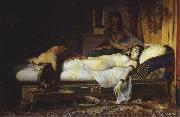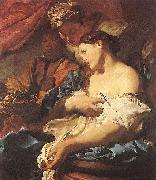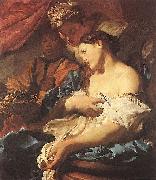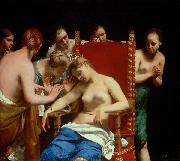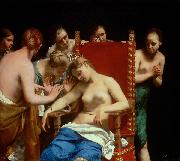Wholesale Oil Painting No Minimum |
|||||||||||
|
|
|||||||||||

|
|||||||||||
|
|
|
||||||||
Jean - Andre RixensFrench, 1846 - 1924 |
||||||||
|
|
||||||||
Death of Cleopatra
Death of Cleopatra Painting ID:: 61965 |
1874. Oil on canva. 78 x 113 in. (200 x 290 cm). Musee des Augustins, Toulouse, France. Bridgeman Art Library. 1874. Oil on canva. 78 x 113 in. (200 x 290 cm). Musee des Augustins, Toulouse, France. Bridgeman Art Library. |
|||||||
|
|
||||||||
Johann LissAlso called Jan Lys, (c. 1590 or 1597 - 1627 or 1631) was a leading German Baroque painter of the 17th century, active mainly in Venice. Liss was born in Oldenburg (Holstein) in Schleswig-Holstein, Germany. After an initial education in his home state, he continued his studies, according to Houbraken, with Hendrick Goltzius in Haarlem and Amsterdam. Around 1620 he travelled through Paris to Venice. He moved to Rome around 1620?C1622, and his first works there were influenced by the style of Caravaggio. Although his earlier work was concerned with the contrasts of light and shadow, his final move to Venice in the early 1620s modified his style and gave impetus to brilliant color and a spirited treatment of the painted surface.In 1627, he was created an admired large altarpiece, the Inspiration of Saint Jerome in San Nicole da Tolentino. His loose brushstrokes seem precursor to rococo styles of Guardi brothers.This final style, along with that of other "foreign" painters residing in Venice, Domenico Fetti and Bernardo Strozzi, represent the first inroads of Baroque style into the republic. Liss fled to Verona to escape the Plague spreading in Venice, but succumbed there prematurely in 1629. According to Houbraken, he worked day and night on his paintings, so that Joachim von Sandrart felt that his health was at risk and urged him to join him in Rome |
||||||||
|
|
||||||||
|
|
Death of Cleopatra
Death of Cleopatra Painting ID:: 72557 |
1622-24
Oil on canvas
97,5 X 85,5 cm
cjr 1622-24 Oil on canvas 97,5 X 85,5 cm cjr |
||||||
|
|
||||||||
LISS, JohannGerman Baroque Era Painter, ca.1597-1631 |
||||||||
|
|
||||||||
|
|
Death of Cleopatra
Death of Cleopatra Painting ID:: 74318 |
Date 1622-24
Medium Oil on canvas
Dimensions 97,5 X 85,5 cm
cyf Date 1622-24 Medium Oil on canvas Dimensions 97,5 X 85,5 cm cyf |
||||||
|
|
||||||||
Guido Cagnacci(January 19, 1601 - 1663) was an Italian painter of the late-Baroque period, belonging to the Forle painting school and to the Bolognese School. Born in Santarcangelo di Romagna near Rimini, he died in Vienna in 1663. He worked in Rimini from 1627 to 1642. After that, he was in Forle, where absorbed the lesson of the Melozzo's painting. Prior to that he had been in Rome, in contact with Guercino, Guido Reni and Simon Vouet. He may have had an apprenticeship with the elderly Ludovico Carracci. His initial output includes many devotional subjects. But moving to Venice under the name of Guico Baldo Canlassi da Bologna, he renewed a friendship with Nicolas Regnier, and dedicated himself to private salon paintings, often depicting sensuous naked women from thigh upwards, including Lucretia, Cleopatra, and Mary Magdalene.This allies him to a strand of courtly painting, epitomized in Florence by Francesco Furini, Simone Pignoni and others. In 1650, he moved to Venice. In 1658, he traveled to Vienna, where he remained under patronage of the emperor Leopold I. His life was at times tempestuous, as characterized by his failed elopement (1628) with an aristocratic widow. Some contemporaries remark him as eccentric, unreliable and of doubtful morality. He is said to have enjoyed the company of cross-dressing models. |
||||||||
|
|
||||||||
|
|
Death of Cleopatra
Death of Cleopatra Painting ID:: 81557 |
nach 1659
Medium Oil on canvas
Dimensions Deutsch: 153 x 168,5 cm
cjr nach 1659 Medium Oil on canvas Dimensions Deutsch: 153 x 168,5 cm cjr |
||||||
|
|
||||||||
Guido Cagnacci(January 19, 1601 - 1663) was an Italian painter of the late-Baroque period, belonging to the Forle painting school and to the Bolognese School. Born in Santarcangelo di Romagna near Rimini, he died in Vienna in 1663. He worked in Rimini from 1627 to 1642. After that, he was in Forle, where absorbed the lesson of the Melozzo's painting. Prior to that he had been in Rome, in contact with Guercino, Guido Reni and Simon Vouet. He may have had an apprenticeship with the elderly Ludovico Carracci. His initial output includes many devotional subjects. But moving to Venice under the name of Guico Baldo Canlassi da Bologna, he renewed a friendship with Nicolas Regnier, and dedicated himself to private salon paintings, often depicting sensuous naked women from thigh upwards, including Lucretia, Cleopatra, and Mary Magdalene.This allies him to a strand of courtly painting, epitomized in Florence by Francesco Furini, Simone Pignoni and others. In 1650, he moved to Venice. In 1658, he traveled to Vienna, where he remained under patronage of the emperor Leopold I. His life was at times tempestuous, as characterized by his failed elopement (1628) with an aristocratic widow. Some contemporaries remark him as eccentric, unreliable and of doubtful morality. He is said to have enjoyed the company of cross-dressing models. |
||||||||
|
|
||||||||
|
|
Death of Cleopatra
Death of Cleopatra Painting ID:: 85569 |
nach 1659
Medium Oil on canvas
cyf nach 1659 Medium Oil on canvas cyf |
||||||
|
|
||||||||
|
Guido Cagnacci (January 19, 1601 - 1663) was an Italian painter of the late-Baroque period, belonging to the Forle painting school and to the Bolognese School. Born in Santarcangelo di Romagna near Rimini, he died in Vienna in 1663. He worked in Rimini from 1627 to 1642. After that, he was in Forle, where absorbed the lesson of the Melozzo's painting. Prior to that he had been in Rome, in contact with Guercino, Guido Reni and Simon Vouet. He may have had an apprenticeship with the elderly Ludovico Carracci. His initial output includes many devotional subjects. But moving to Venice under the name of Guico Baldo Canlassi da Bologna, he renewed a friendship with Nicolas Regnier, and dedicated himself to private salon paintings, often depicting sensuous naked women from thigh upwards, including Lucretia, Cleopatra, and Mary Magdalene.This allies him to a strand of courtly painting, epitomized in Florence by Francesco Furini, Simone Pignoni and others. In 1650, he moved to Venice. In 1658, he traveled to Vienna, where he remained under patronage of the emperor Leopold I. His life was at times tempestuous, as characterized by his failed elopement (1628) with an aristocratic widow. Some contemporaries remark him as eccentric, unreliable and of doubtful morality. He is said to have enjoyed the company of cross-dressing models. Death of Cleopatra nach 1659 Medium Oil on canvas cyf |
||||||||
|
|
||||||||
|
Prev Next
|
||||||||
|
|
||||||||
|
Related Paintings to Guido Cagnacci :. |
||||||||
|
|
||||||||
|
CONTACT US |
